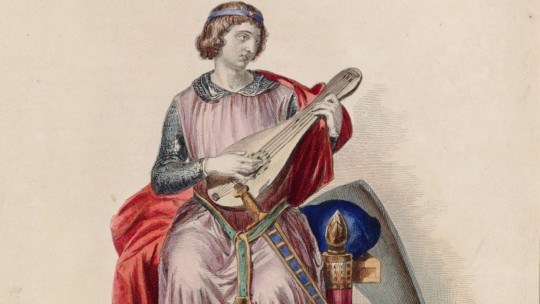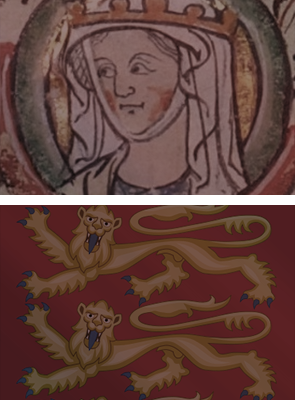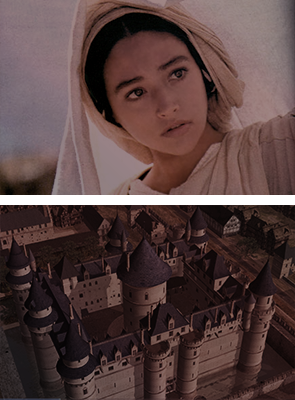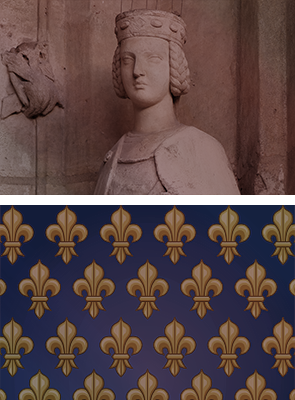#hugues x de lusignan
Text
Thibaut le Chansonnier.

The present count of Champagne, Thibaut IV, is a poet. Guarded through his minority by his capable mother, Blanche of Navarre, Thibaut grew up to marry, one after the other, a Hapsburg, a Beaujeu, and a Bourbon princess, by whom he had eight children. To these children he added four more, products of his numerous love affairs. But the enduring passion of his life was a chaste one, owing to the inaccessibility of its object, the queen of France. This lady, Blanche of Castile, wife and widow of Louis VIII and mother of Louis IX (St.-Louis), was a dozen years Thibaut’s senior. Nevertheless Thibaut’s penchant for Blanche was such that he was suspected of poisoning her husband when the king died suddenly. The injustice of the accusation provoked Thibaut to join a couple of baronial troublemakers, Hugo of La Marche and Peter of Brittany, in a sort of antiroyal civil war. When on sober second thought Thibaut changed his mind, Hugo and Peter turned their spite against him and invaded Champagne, setting haystacks and hovels ablaze. Stopped by the walls of Troyes, they were forced to turn around and go home when a relieving force arrived, sent by Queen Blanche.
Partly as a result of the war, Thibaut was constrained to sell three of his cities—Blois, Chartres and Sancerre—to the king of France. At the last moment he felt a reluctance to hand over Blois, cradle of his dynasty, and carried stubbornness to the point of courting a royal invasion. But forty-six-year-old Blanche of Castile dissuaded thirty-three-year-old Thibaut in an interview of which the dialogue was recorded, or at least reported, by a chronicler:
Blanche: Pardieu, Count Thibaut, you ought to have remembered the kindness shown you by the king my son, who came to your aid, to save your land from the barons of France when they would have set fire to it all and laid it in ashes.
Thibaut (overcome by the queen’s beauty and virtue): By my faith, madame, my heart and my body and all my land is at your command, and there is nothing which to please you I would not readily do; and against you or yours, please God, I will never go.
Thibaut’s fancy for Blanche needed sublimation. Sage counselors recommended a study of canzonets for the viol, as a result of which Thibaut soon began turning out “the most beautiful canzonets anyone had ever heard” (a judgment in which a later day concurs). The verses of Thibaut the Songwriter were sung by trouvères and jongleurs throughout Europe. A favorite:
Las! Si j’avois pouvoir d’oublier
Sa beauté, a beauté, son bien dire,
Et son très-doux, très-doux regarder,
Finirois mon martyre.
Mais las! mon coeur je n’en puis ôter,
Et grand affolage
M’est d’espérer:
Mais tel servage
Donne courage
A tout endurer.
Et puis, comment, comment oublier
Sa beauté, sa beauté, son bien dire,
Et son très-doux, très-doux regarder?
Mieux aime mon martyre.
[Could I forget her gentle grace,
Her glance, her beauty’s sum,
Her voice from memory efface,
I’d end my martyrdom.
Her image from my heart I cannot tear;
To hope is vain;
I would despair,
But such a strain
Gives strength the pain
Of servitude to bear.
Then how forget her gentle grace,
Her glance, her beauty's sum,
Her voice from memory efface ?
I'll love my martyrdom.]
Frances & Joseph Gies- Life in a Medieval City
#xiii#frances & joseph gies#life in a medieval city#thibaut le chansonnier#thibaut iv de champagne#thibaut i de navarre#blanche de navarre#blanche de castille#louis viii#louis ix#hugues x de lusignan#pierre i de bretagne#pierre mauclerc#pierre de dreux
5 notes
·
View notes
Photo




WOMEN’S HISTORY † ISABELLA OF ENGLAND, HOLY ROMAN EMPRESS (1214 – 1 December 1241)
Isabella of England was the second of three daughters of John I of England and Isabelle d’Angoulême. Her father died in 1216 when she was a baby and during a time when most of the Anglo-Norman barons were in revolt against him. After his death, however, William Marshal married to rally them around Isabella’s elder brother, Henry, and convince them to expel the future Louis VIII de France. In 1220, her mother married Hugues X de Lusignan and maintained permanent residence in France while Isabella and her brothers and sisters stayed in England.
In 1235, Holy Roman Emperor, Friedrich II sought Isabella’s hand in marriage on the advice of Pope Gregorius IX, with the betrothal formalized in February. As part of the agreement, Friedrich demanded a dowry of thirty thousand marks, which Henry had to levy a heavy tax in order to fulfill. Isabella and Friedrich married on 15 or 20 July 1235 when she was around 21 and he was 40. Like Friedrich’s previous wife, Isabelle II de Jérusalem, Isabella primarily lived in seclusion in Noventa Padovana. When her brother, Richard, Earl of Cornwall, visited Italy on his return from the Baron’s Crusade of 1239-1241, the two were allowed to visit each other, though Isabella was not allowed to attend the formal reception.
It is known that Isabella and Friedrich had at least four children together, but their birth order is uncertain. What is known is that she had a son who died soon after birth, though his name is uncertain; a daughter named Agnes who also died young; a son named Heinrich who died in his teens; and a daughter named Margarete, who was the only one of her children to reach adulthood. Isabella died in childbirth on 1 December 1241 and was buried beside Isabelle II de Jérusalem (who had also died in childbirth) in Andria Cathedral. In 1255, Isabella’s only surviving child, Margarete, married Albrecht II. der Entartete, Markgraf von Meißen and was an ancestor of both the Ernestine and Albertine lines of the House of Wettin.
#isabella of england#house of plantagenet#house of hohenstaufen#english history#french history#german history#italian history#european history#medieval#women's history#history#women's history graphics#nanshe's graphics
16 notes
·
View notes
Photo



WOMEN’S HISTORY † SAINT ISABELLE DE FRANCE (March 1224 – 23 February 1270)
Saint Isabelle de France was the only surviving daughter of Louis VIII de France and Blanca de Castilla. Her brothers were Saint Louis IX, Robert d'Artois, Alphonse de Poitiers, and Charles I of Naples and Sicily. Her father died in 1226 and thus, Isabelle and her brothers were primarily raised by their intelligent and deeply devout mother. The fact that all of Isabelle's brothers all had no illegitimate children is often attributed to their mother's influence.
In 1230, Isabelle was betrothed to Hugues XI de Lusignan, son of Hugues X de Lusignan and Isabelle d’Angoulême, but the marriage was never celebrated because Isabelle refused to consent to the marriage. Later on, Isabelle also refused the hand of Konrad IV, Herzog von Schwaben (son of Holy Roman Emperor Friedrich II and Isabelle II de Jérusalem) and declared that she intended to remain a virgin throughout her life.
In 1255, Isabelle declared that she wished to a found a monastery of Poor Clares and her brother, Louis, acquired the land in the forêt de Rouvray. The monastery was built between 1256 and 1259. Afterwards, Isabelle took up residence in the convent, though she never took the formal vows to become a nun. She died 23 February 1270, six months before Louis perished on the Eighth Crusade. After their deaths, their younger brother, Charles, testified to the Pope about their piety and sanctity. Louis was finally canonized in 1297 and Isabelle in 1696.
#isabella of france#house of capet#french history#european history#women's history#history#medieval#women's history graphics#nanshe's graphics
250 notes
·
View notes